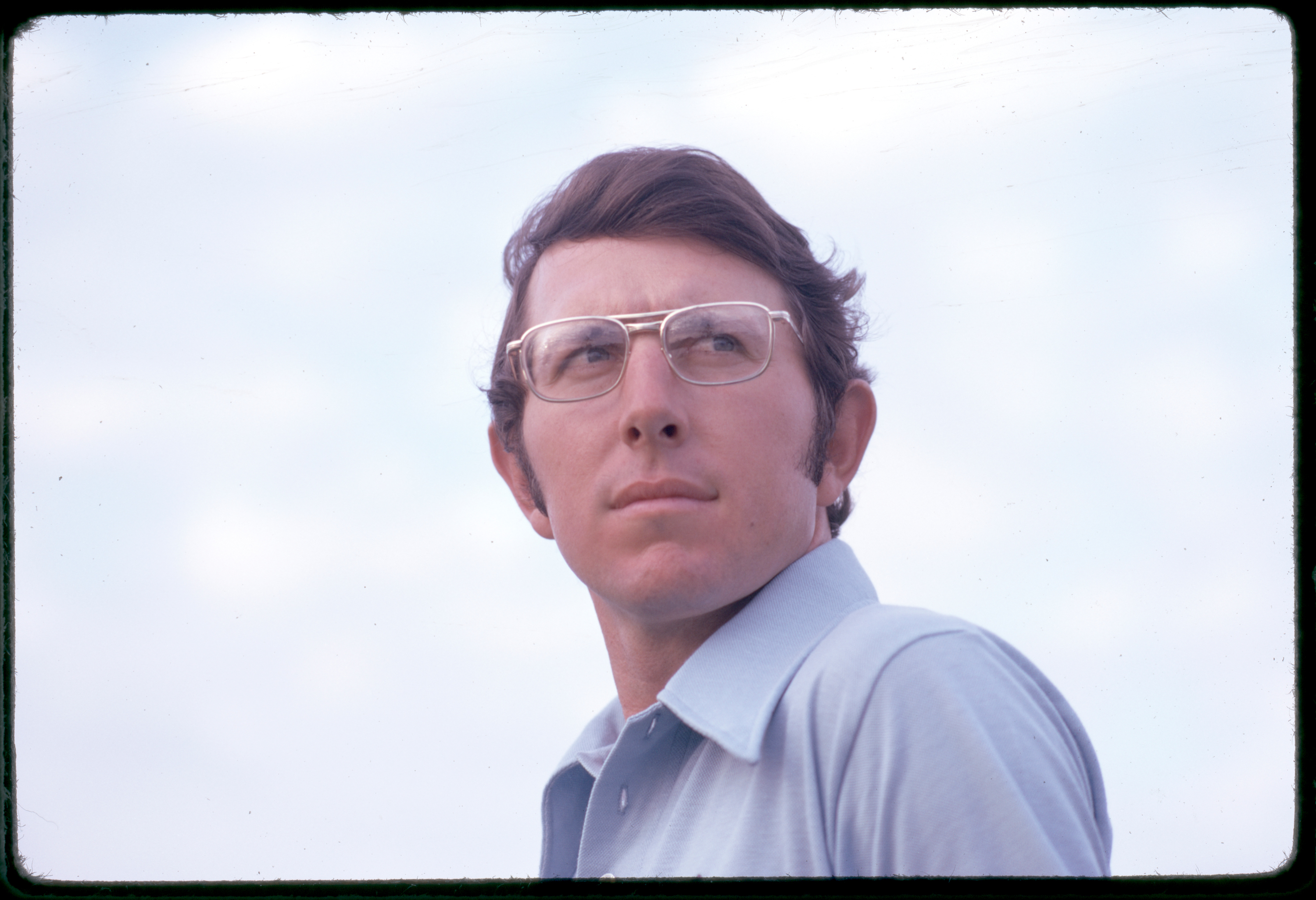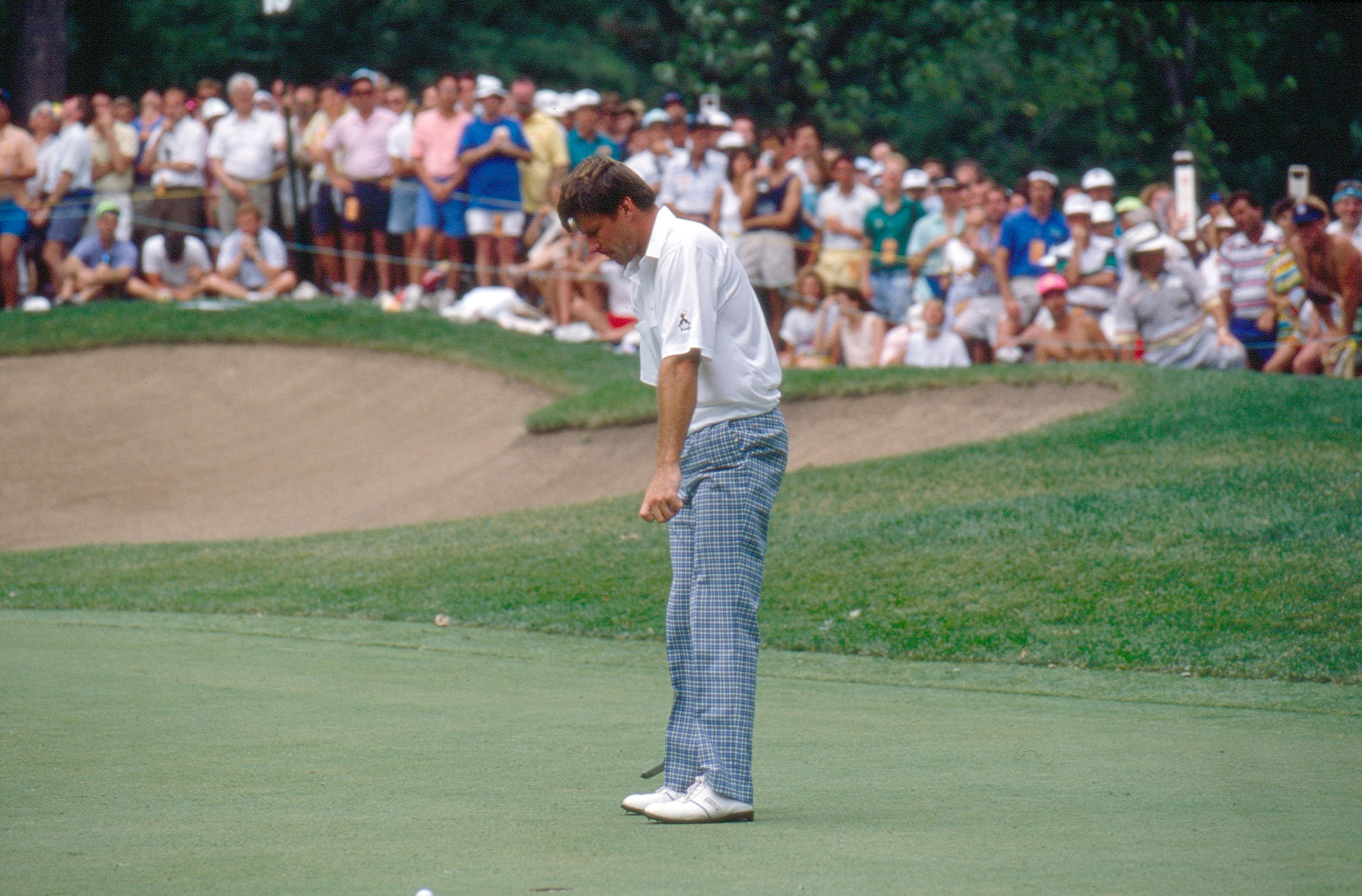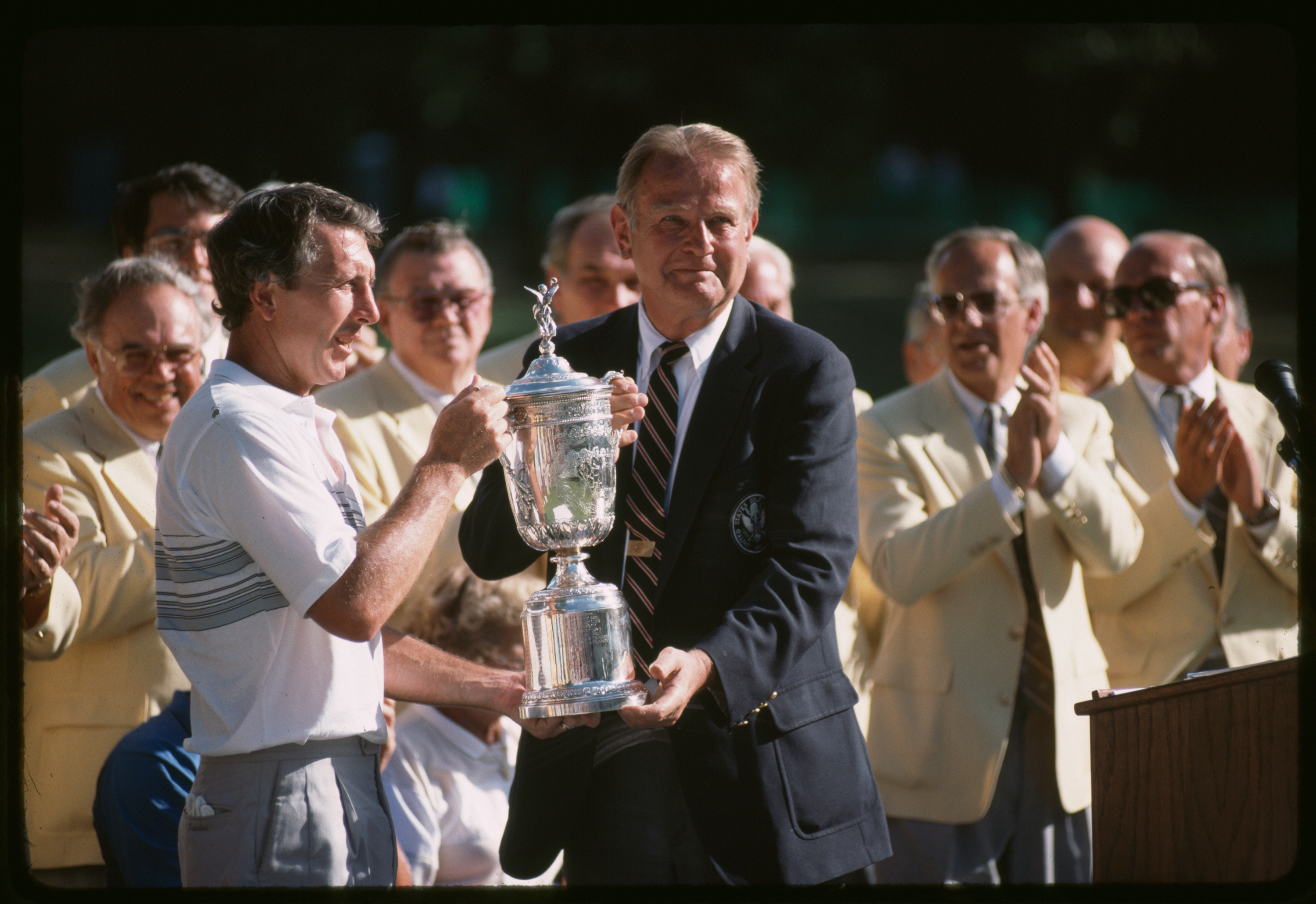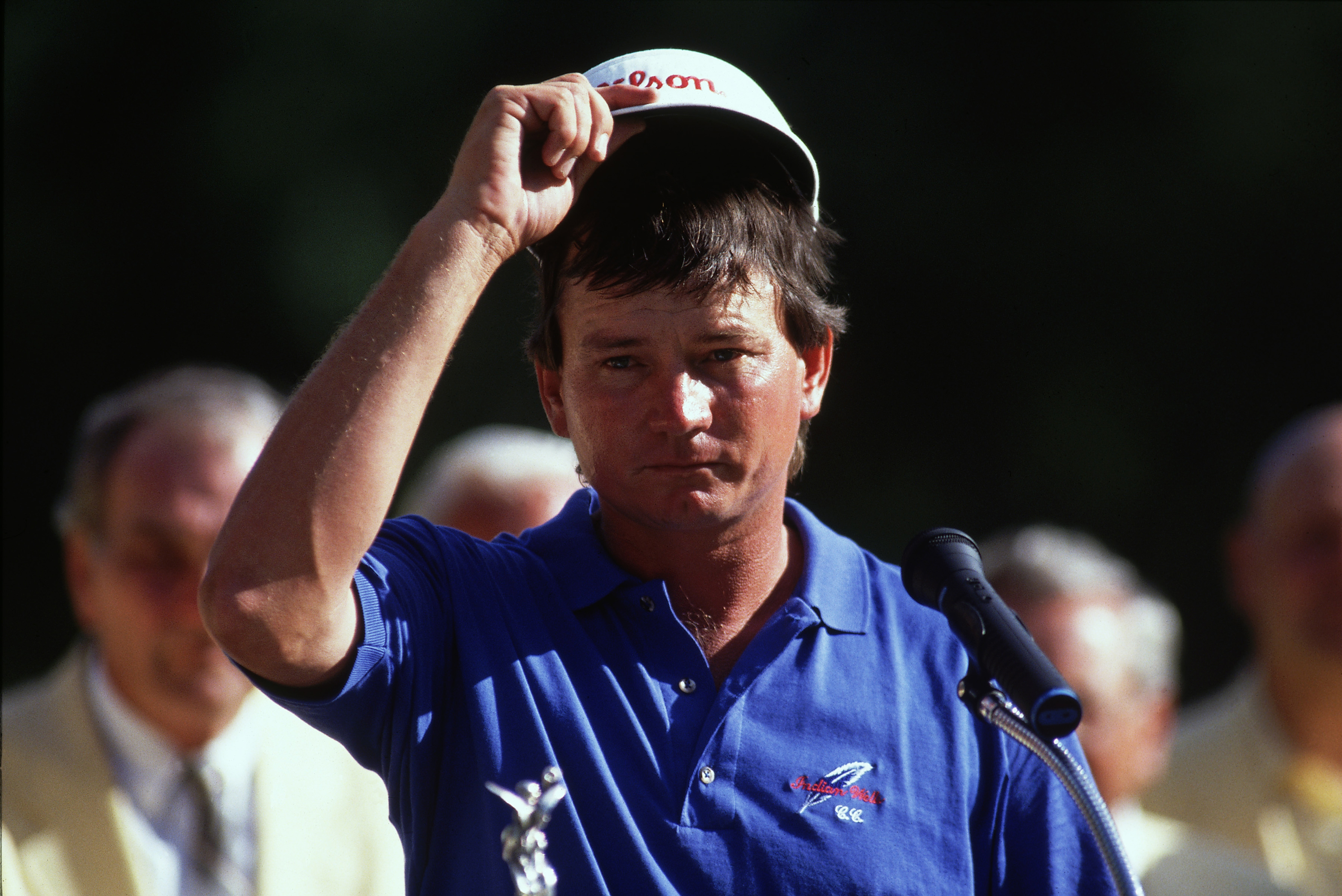
Early in the week of the 1990 US Open at Medinah, the bookmakers had Nick Faldo as narrow, 9-1, favourite. The Englishman had won a second straight Masters Tournament two months earlier and was thus the only man in the field who had the opportunity to secure a “Grand Slam” that season. Just behind him in terms of interest in the paddock was Curtis Strange at 10-1. The American was looking to emulate the exploits of North Berwick-born Willie Anderson, some 85 years earlier, and win three consecutive instalments of the American national championship. Others who were fancied by the pundits and punters at Medinah included the likes of Greg Norman, Payne Stewart and Seve Ballesteros.
Hale Irwin was not being talked about. Although he had won the US Open twice before, back in the 1970s, he hadn’t won on the PGA Tour for more than five years and had only returned three top-five finishes on the circuit over the previous 18 months, although one of those had come in the Kemper Open in the lead-up to this, the 90th US Open. Despite that, Irwin wasn’t considered a likely contender at Medinah. He was 45 and the course was the longest ever seen for a US Open, measuring some 7,195 yards. He was playing at Medinah only thanks to a “special exemption” from the USGA.
A Sleeping Monster

In the practice rounds there were differing views on how the “Monster” Medinah would play. 1989 Open champion Mark Calcavecchia described it as “the easiest” he had ever seen it while Greg Norman believed the course was drying out and could become extremely difficult. The Australian’s stance was the one agreed with by the USGA who feared the conditions could make the layout (particularly the greens) overly firm and fast, so they raised cutting heights to prevent any chance of them becoming unplayable.
That seemed a shrewd move until a massive thunderstorm blew in on the afternoon and evening before the championship started. The course was soaked and as Malcolm Campbell said, writing for Golf Monthly at the time, “All the fire was taken out of it.”
The course was soft and by most accounts turned into a layout more akin to a regular PGA Tour tournament track. As such, PGA Tour regulars had a field day in round one. The top-10 through 18 holes were all home golfers – 1987 US Open winner Scott Simpson, talented Tim Simpson (no relation) and 1988 PGA Champion Jeff Sluman led the way, having posted 66s. The chasing pack included names that were lesser-known to golf fans on our side of the pond – Mike Donald, Emlyn Aubrey and Billy Ray Brown for instance. Hale Irwin posted a solid 69 to be tied 8th.
A Star Sportsman

Irwin had been a star sportsman since his days at Boulder High School in the early 1960s. He excelled in football and baseball, as well as golf. Born in 1945, a month after VE Day, Irwin was introduced to golf by his father and immediately showed natural aptitude.
Irwin continued to split his sporting interests at the University of Colorado where he shone as a defensive back before also winning the individual NCAA Championship in 1967… An incredible collegiate record.
He turned pro in 1968 and was winning tournaments on the PGA Tour by 1971. In an era of golfing greats like Jack Nicklaus, Tom Watson, Gary Player and Johnny Miller, Irwin did far more than hold his own. Through the 1970s he won two US Opens, the Piccadilly World Matchplay and made 86 consecutive cuts on the PGA Tour between 1975 and 1978. He was never outside the top five in Mark McCormack’s World Ranking during that spell.
But by 1990, it would have seemed to most his best years were behind him. Multiple wins each season had been replaced by the occasional top-10. In 1990, not many players continued to play at their peak beyond the age of 40, and Irwin was 45. (Although he looked a little younger than that having recently swapped his trademark spectacles for contact lenses.)
And the popular veteran was still there or thereabouts after round two. With conditions remaining benign, he had hit 31 of 36 greens at the halfway stage to sit tied fifth, four back of Tim Simpson. The leaderboard continued to look like one from a regular PGA Tour event, although Ian Woosnam had snuck into the top-10.
A couple of young amateur players of note made the cut, making their Major debuts. 19-year-old Phil Mickelson went on to finish in 29th place with 18-year-old David Duval ending the week in 56th spot.
Chances For Faldo

By the end of round three, it was still two of the unlikely protagonists who shared the top spot.
Billy Ray Brown, a 27-year-old from Texas playing in just his second Major and without a victory as a professional and Mike Donald, a one-time PGA Tour champion who had missed four of his last five cuts in the Majors.
The British press was certainly not much interested in the frontrunners. Writing in the Sunday Mirror, 1970 US Open champion Tony Jacklin dismissed Brown and Donald as “little-known Americans.” The focus on this side of the pond was on the chances of Woosnam who had continued to play steadily and Nick Faldo who had climbed the board with a third-round 68.
In the final round, Mike Donald (with his brother Pete on the bag) started the fastest with two birdies out of the traps. He then went into US Open mode and, in his words “Parred the thing to death” for the remainder of the round, save a crucial dropped shot at the 16th.
Faldo played some fine golf but was also left to rue a bogey at the 16th which, eventually saw him finish with one shot to many. He had a putt on the 72nd hole that grazed the edge and would have made all the difference. Faldo would be back though – winning a second Open Championship at St Andrews a month later.
The UK press felt that Faldo had deserved better at Medinah though. Writing in the Evening Standard, Renton Laidlaw said, “The course was set up by the USGA to find the best golfer of the week. They failed…”
Irwin Goes On A Run

It was a harsh appraisal and one Laidlaw did caveat by citing the play of Irwin – The American went on an incredible tear on the back nine on Sunday, with four straight birdies from the 11th then, on the 72nd, the moment the event will be most remembered for – Irwin holed a 45 footer that crossed the green and took a full seven seconds to reach the cup before it dropped and Irwin lofted his arms and did a lap of victory around the 18th green. He had shot a 67 and posted eight-under for four rounds.
“I was not expected to win this week,” he said. “But Hale Irwin is not ready to be put away yet.”
Only Donald could match Irwin’s final score of 280 and he did so – If it hadn’t been for the bogey on the 16th, he would have won by one. An 18-hole playoff was required to settle the tournament.
In the playoff, the wind did blow and Medinah became more like the monster it had been billed as. Donald and Irwin fought a war of attrition that the lesser-known man appeared to be winning as he built a two-shot lead through 12 holes, and held it through 15. But Irwin birdied the 16th and Donald bogeyed the 18th. Both men had shot 74. For the first time in the history of the championship play had to go to a 91st hole.
Sudden Death

It was Irwin who took his chance on that first sudden-death hole. He played a great approach to some eight-feet and rolled in the putt to claim a highly memorable third US Open title. He became the oldest man in history to win it.
“I don’t even remember that putt going in,” Irwin said of his final stroke. “I can reveal it now that I had a dream two weeks ago about winning the US Open. I can’t remember the details, only that it was an ordeal… Like this one!”
Irwin had come into the week on a special exemption, and he left Medinah with a cheque for $220,000 and a new 10-year exemption to play in the championship. It was the starting point for a second phase in Irwin’s career, he won again the following week in the Buick Classic and latterly went on to enjoy a hugely successful senior career, winning 45 times on the Champions Tour. Would that have happened if Donald had held him off at Medinah? Who knows.

The loss must have been tough to take for Donald, particularly when he had held the lead with three to play on two straight days… But the journeyman tried to see the positives after Irwin’s final putt had denied him. “If I can’t be happy with a week like this then I shouldn’t play golf,” he said philosophically. It was the high point of Donald’s career and he enjoyed little success on the PGA Tour after Medinah '90 – just a smattering of top-10 finishes.
Irwin was vocal in his praise for his playoff adversary but one line in his post round interviews probably best summed up his feelings on getting over the line and re-finding his winning touch – “God bless Mike,” he said.







